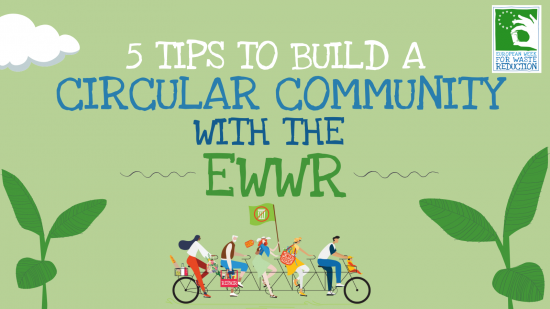(Read this article in French and Greek)
Interesting actions for the 13th edition of the European Week for Waste Reduction are already arriving! Remember, you have until 12 November to register your action at the 2021 EWWR, which is taking place between 20 and 28 November. If you are still hesitating about your idea, do not wait any longer and contact your Coordinator to get all the support you need.
In the meanwhile, let us guide you through the challenging topic of Circular Communities. If you have never heard about circular economy, this is a great day to start shaping your life in a new and exciting way. If you are aware of the circular approach but still trying to figure out how to organise an action to build your own circular community, you will find here a list of inspiring ideas and elements to consider to make your action a success!
What is a circular economy?
We talk of circular economy to refer to an alternative to the traditional and linear industrial model (take-make-waste). This linear concept of development has brought our society to face unprecedented challenges: lack of natural resources; high levels of pollution of air, water, and soil; overwhelming of plastic items in the sea; exploitation of fertile lands transformed into landfills to contain our waste; etc. The circular approach is a new way of development that keeps the resources in use as long as possible. Everything is not merely reused but even designed and built with the idea of transforming the elements and resources in something new.
The circular economy concept should be a central component in local and regional economies, which have a suitable scale for closing resource loops, creating sustainable circular ecosystems and designing participatory community-based innovation schemes. This is the reason why we decided to focus the 2021 edition of the EWWR on circular communities. Together we will prove the great power that local communities can play in promoting circular resource loops, sustainable production and consumption patterns, as well as waste prevention tangible results.
How to shape a circular community?
You will find below our 5 tips to keep in mind when planning your action; even better if you are able to mix more of them. By the way, if you think that this is a new unexpected topic for the EWWR campaign, you are very much wrong. In fact, this year we decided to simply highlight the role of local communities, which have been part of the campaign for years. To prove our point, you will find actions registered in the previous editions associated to each tip. Ready? Let’s go!
1) Generate positive effects on environment and society: promote solidarity!
Promoting waste reduction while producing positive effects on your own community, or on a specific target of people in need, is a great way to contribute in building a sustainable, just and ethic society.
- Launch of a circular economy for medical aids in Haute-Saône implemented by Mutualité Française de Haute-Saöne (France) – Business/Industry category – Edition 2019
- Re’Compota implemented by ADCE – Associação de Desenvolvimento do Concelho de Espinho (Portugal) – Association/NGO category – Edition 2020
2) Exchange knowledge to engage more people in the change
Sharing knowledge is a great way of promoting waste prevention by practically teaching how to embrace a circular lifestyle, or how to transform a waste in a resource, or even how to prepare homemade cleaning products. By organising workshops and trainings, you gather together people interested in reducing the production of waste and you shape a new community which will spread the circular approach in every aspect of their lives.
- AmbiMapp, your guide to a sustainable lifestyle implemented by Ambimente (Italy) – Citizen(s) category – Edition 2019
- “From scrap to shoes” upcycling workshop implemented by Andrea Natterer (Germany) – Citizen(s) category – Edition 2019
3) Facilitate collaboration among local actors and organisations
The action of a single person can generate a circular community, but the impacts are multiplied when the activity results from the collaboration of more people or organisations. You can increase the impact of your action by involving key local stakeholders such as shops, public authorities, organisations, schools, elderly houses, businesses, etc. This will also increase the chance that your action will be continued in the future. Indeed, an action of the EWWR can be the starting point of a long-lasting collaboration that will bring positive impacts on your community and on the environment.
- Nudging as behavioral change strategy to reduce waste at Hotelschool implemented by Hotelschool The Hague (The Netherlands) – Educational establishment category – Edition 2019
- School and commerce, anti-waste symbiosis implemented by Resid’US (Catalonia, Spain) – Business category – Edition 2018
4) Reduce resource consumption through sharing
Sharing items and services at local level is easier and convenient. Get in touch with people from your neighbourhood (or your school, company, family, etc.) and together reduce resource consumption by moving towards renting or sharing items and services instead of owning them.
- The Cloughmills library of things implemented by Cloughmills Community Action team (Norther Ireland, United Kingdom) – Association/NGO category – Edition 2018
5) Launch challenges to promote a less-waste lifestyle
A time-limited challenge (for instance during a week) on reducing waste is a good strategy to encourage more people to change their daily habits. Even people that think they are not ready to adopt a more sustainable and circular lifestyle will have the strength to try to change their habits for a short amount of time. By engaging people in a challenge, you can also share information and advices that will keep inspiring them even once the challenge is over. Furthermore, if you plan several challenges in the future (for instance, once a year), this will build up the connection among the people involved, shaping a (circular) community.
- Bye Bye Plastic Sylt implemented by Bye Bye Plastik Sylt Citizens (Germany)– Citizen(s) category – Edition 2020
- La LouvieR3: zero waste objective implemented by the City of La Louviere (Belgium) – Public administration category – Edition 2018
Explore the factsheets of all the actions (soon in many languages).
Discover the 5 tips on a visual factsheet (soon in many languages).
 EN (full site)
EN (full site) ITA
ITA FRA
FRA POR
POR ESP
ESP CAT
CAT DEU
DEU NED
NED HUN
HUN